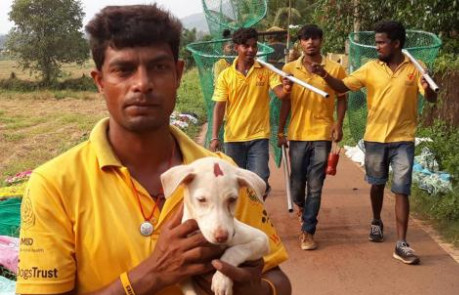Monday 7th May 2018, 9:00am
First Stepwise Approach to Rabies Elimination Workshop in India shows commitment of the Government of Goa towards rabies freedom.

Despite being one of the world’s oldest known diseases, rabies continues to inflict death and suffering across the globe. India is estimated to carry a third of the global rabies burden at a cost of 2.4 billion USD, 4.5 million human exposures and 20,000 deaths every year.
In April 2018, the Government of Goa hosted the first Stepwise Approach to Rabies Elimination (SARE) Workshop to be held in India, in partnership with Mission Rabies, Centers for Disease Control and Prevention (CDC) and the University of Edinburgh.
This historic landmark signifies the growing commitment and focus to make Goa the first state in India to declare rabies freedom.
"Now is a critical time for research in rabies control. Despite a great body of evidence on how rabies elimination is possible, this must now be applied at scale and communicated in a way that engages community leaders and politicians."
The workshop, hosted by the Department of Animal Husbandry and Veterinary Services, brought together stakeholders from across government departments, fostering a One Health perspective on rabies control. The facilitators were Dr Ryan Wallace from CDC Poxvirus and Rabies Unit, University of Edinburgh PhD students and senior Mission Rabies staff, Dr Andy Gibson and Dr Frederic Lohr.
The SARE exercise helped participants to identify current rabies control activities and the next steps towards rabies elimination. The exercise made it clear that significant progress has been made over the past five years but it highlighted some areas that require further attention, including formalisation of cross-sectoral data reporting, standard operating procedures and enhanced surveillance through Integrated Bite Case Management.
The workshop included a Global Dog Rabies Elimination Pathway (GDREP) exercise that estimated time frames and cost of rabies elimination using data provided by participants. They established milestone targets for zero rabies deaths by 2020, zero canine deaths by 2023 and declaration of rabies freedom in 2025.
In recent years, much has been done in Goa to prevent rabies, with over 96,000 dogs being vaccinated in 2017, 150,000 children educated and 150 dogs tested for rabies in the newly equipped State Disease Investigation Unit laboratory.
Opportunities to increase vaccination coverage and improve cost-efficiency are being explored in collaboration with the University of Edinburgh and CDC. The Minister of Animal Husbandry emphasised a need to develop interventions that improve the broader management of dog populations in conjunction with rabies control, something that Worldwide Veterinary Services are actively exploring in Goa.
Eliminating rabies goes through declaring it as a priority, establishing robust protocols and legislation and demonstrating effective practices for dog vaccination and surveillance in the field. The SARE Workshop was a firm declaration from across Government Departments that Goa is committed to progressing on the path to rabies elimination.
"The incredible progress made in Goa has only been possible due to the commitment of the Government of Goa to prioritise the issue of rabies, combined with many institutions committed to supporting the government in developing solutions to the benefit of the Goan people and other states in India. These supporters include Mission Rabies, Dogs Trust Worldwide, MSD Animal Health, The Rotary Club, National Institute for Mental Health and the University of Edinburgh."
Dr Andy Gibson, Director of Strategic Research, Mission Rabies & PhD student, University of Edinburgh"This workshop showed the enormous benefit of bringing together stakeholders from across departments to work on a problem. Rabies is a true One Health example, where human and animal health sectors must work together to eliminate the disease."
Dr Frederic Lohr, International Operations Manager, Mission Rabies & PhD student, University of Edinburgh